 ... to the sum of the extremes multiplied by half the number of terms. Rule. — Add the extremes together, and multiply their sum by half the number of terms ; the product will be the sum of the series. ... to the sum of the extremes multiplied by half the number of terms. Rule. — Add the extremes together, and multiply their sum by half the number of terms ; the product will be the sum of the series.  Elements of Algebra - Page 248by Bourdon (M., Louis Pierre Marie) - 1831 - 304 pagesFull view Elements of Algebra - Page 248by Bourdon (M., Louis Pierre Marie) - 1831 - 304 pagesFull view - About this book
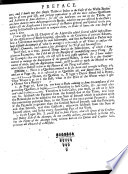 | Alexander Malcolm - Arithmetic - 1718 - 396 pages
...Propafition, it follows clearly, that the Sum of all the Terms of an Arithmetical Progreffion, is equal to the Sum of the Extremes multiplied by half the Number of Terms; but if that Number is odd, multiply the forefaid Sum, by that whole Number ; and half the Product is... | |
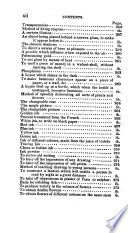 | William Enfield (M.A.) - Amusements - 1821 - 302 pages
...• 8 . 10, + 10 = 2 x 6 ;4 + 8 = 2x6 ^ In the first case, the sum of an arithmetical progression, is equal to the product of the sum of the extremes multiplied' by half the number of terms; and in the second, to the product of the mean multiplied by the number of terms. THEOREM III. 23. In... | |
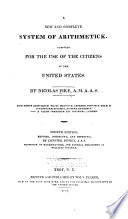 | Nicolas Pike - Arithmetic - 1822 - 536 pages
...equal to the mean (or half the sum of the two extremes) multiplied by the whole number of terms ; or to the sum of the extremes multiplied by half the number of terms. The sum of auy number of terms of the arithmetical series of odd numbers 1 , 3, 5, 7, 9, &r.. is equal... | |
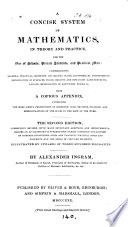 | Alexander Ingram - Mathematics - 1830 - 458 pages
...distant from it. PROP. III. — The sum of any number of terms in arithmetical progression is equal to the sum of the extremes multiplied by half the number of terms. For by adding the extremes, and every two equally distant from them, we obtain equal sums, of which... | |
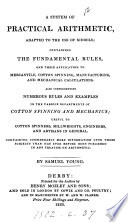 | Samuel YOUNG (of Manchester.) - 1833 - 272 pages
...difference of the extremes divided by the number of terms minus one. And the sum of the series is equal to the sum of the extremes multiplied by half the number of terms. (1) Given the extremes 12 and 42, and the number of terms 11. Required the common difference, and sum... | |
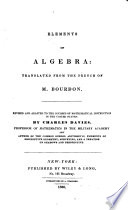 | Charles Davies - Algebra - 1835 - 378 pages
...the sum of a progression by differences, is equal to half the sum of the two extremes, multiplied by the number of terms. If in this formula we substitute for I its value, a-\-(n— l)r, we obtain [2a+(nl)r]n . 8= -------- 2 ----- ' but the first expression is the most useful.... | |
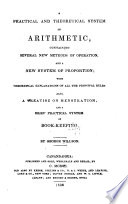 | George Willson - Arithmetic - 1836 - 202 pages
...of this proposition is evident. PROPOSITION III. The sum of all the terms of the series, is equal to the sum of the extremes multiplied by half the number of terms ; or, multiplied by the number of terms, and the product divided by 2. For example, 1, 3, 5, 7, 9,... | |
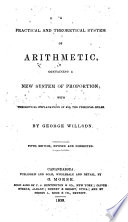 | George Willson - Arithmetic - 1838 - 194 pages
...of this proposition is evident. PROPOSITION III. The sum of all the terms of the Series, is equal to the sum of the extremes multiplied by half the number of terms ; or, multiplied by the number of terms, and the product divided by 2. For example' 1, 3, 5, 7, 9'... | |
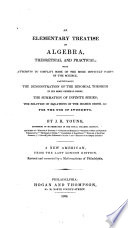 | John Radford Young - 1839 - 332 pages
...(» — l)d. THEOREM 5. The sum of any series of quantities in arithmetical progression is equal to the sum of the extremes multiplied by half the number of terms. Let a + (a + d) + (o+2d) + (a + 3d) + &c. be the progression ; then, if the number of terms be represented... | |
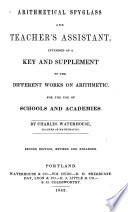 | Charles Waterhouse - Arithmetic - 1842 - 178 pages
...by the number of terms less 1. 4. The sum of all the terms in any equidifferent series, is equal to the sum of the extremes, multiplied by half the number of terms. The reason of these Principles, and the following Problems or cases, it is presumed, is sufficiently... | |
| |